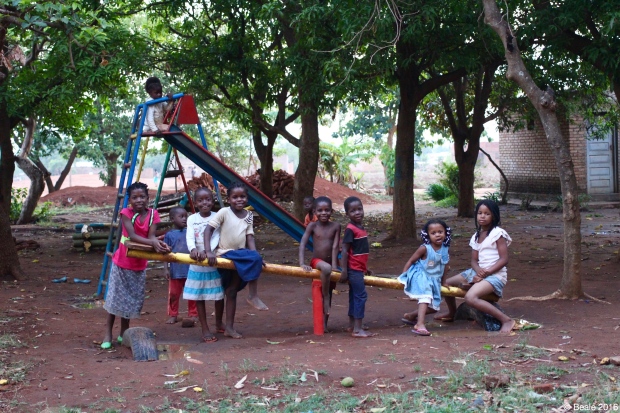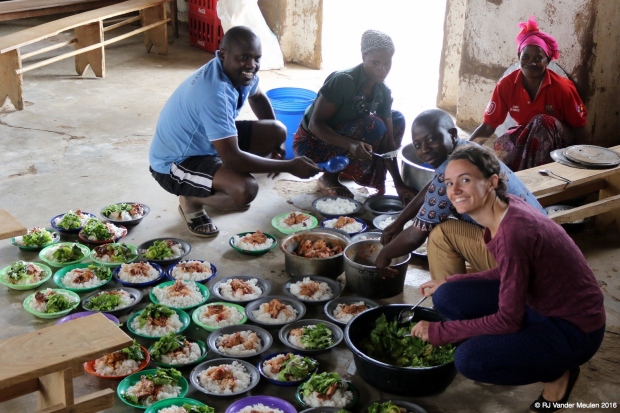In our plan for our Safari we wrote about exploring the the idea of community and I’ve been wanting for a while to start collecting together some of our thoughts around this. This will be the first of hopefully many blog posts as we learn but this one tries to articulate our motivations behind wanting to find out more. (Massively simplified because it’s supposed to be a blog post and not an essay!) The next post will talk a bit more about some different manifestations of intentional community, particularly in reference to lots of inspirational people we have met so far on our journey and based around our time in Cape Town. (We’re really behind, having now been in Australia for a month!)
——-
Life in Mozambique is communal. The children play near friends houses and either fall asleep there or make their way home as the sun starts to set. Those children will be disciplined by any other adult in the community and in the same vein a crying child will end up tied to the back of the nearest female over the age of about 5 regardless of relationship. This was sometimes quite confusing as it could take a while to work out whose baby was whose. Andy and I jokingly coined the phrase ‘social communication’ within a few weeks of living in Moz referring to those times when everyone just seems to know something (for example the visit of a VIP) without the use of radio, newspaper, facebook or any other way in which information is communicated in our culture. Sometimes this social communication can manifest more like gossip and people really are always talking and sharing information but it’s also an outward sign of the dependency on community.
In Mozambique, the communities in which we were living were our lifeline. I use the plural communities intentionally as I think we had the privilege of a few – our neighbourhood, the church and the small community of missionaries in our town. Here, I’ll just focus on the first. During our time in Mozambique we lived on church property which meant that our closest neighbours were the archdeacon of the church and his family. On the other side of us, about 20 metres away, was a family not connected with the church; next to them other families spreading out to form a neighbourhood or bairro. Our bairro was called Samora Machel after the first president of independent Mozambique. Each bairro has a secretário de bairro (secretary of the neighbourhood) who is the contact for any issues and the resolver of any community disputes (from marital issues to rent agreements). The children seemed to roam freely but in reality would rarely leave the bairro, sticking to their territory. When our neighbours’ house went up in flames, people from the bairro came to help. When a child in the neighbourhood died, someone came to our door to collect our contribution to the funeral. When we needed to start a fire we’d borrow a hot coal from a neighbour, and a ‘I’ve made it!’ moment for me was when a neighbour came to take a hot coal from our fire! Our neighbours knew a lot of things that we didn’t and were vital in us surviving: they taught us what to do when our house was invaded by ants, they explained the strange smell in the well after hundreds of termites died in it, they looked out for our house while we travelled and they showed us where to buy black market fuel when there was none left in the pumps in town. Hospitality is a given in Mozambique – if we passed by a neighbour’s house we’d be expected to sit and chat and probably end up being invited for lunch or dinner as Andy discussed in his last blog post. He also talks about the generosity of people in sharing what they have – it’s almost like everything is already communal (which it is in reality as we and they believe that all we have comes from God and is not our own possession). If we cooked pizza we’d have to make sure there was enough for the surrounding families whose children would sit and watch as we started the fire and began to cook. In Milange, like it or not (for sometimes we didn’t), life was communal.
It made a stark contrast to when we lived in London. Then we didn’t even know our neighbours and we certainly wouldn’t have had the kids from up the road turning up unannounced to play in our home. We had no one to borrow sugar from and little to no social communication.
To us, something about the way of living that we experienced in Milange made us feel excited and it seems to us that, as humans, we are designed to do life together, in community. We realised that going back to the UK, that was something we would need to be intentional about as it is a way of living that is becoming harder to find, particularly in western urban centres. As we’ve been thinking about this more and more over the last year or so we’ve come across some interesting support for the passion we feel about community and how to live more connectedly.
An interesting article published last year talks about how our housing choices affect our ability as adults to have deep friendships. In the article the author writes: “For the vast majority of Homo sapiens‘ history, we lived in small, nomadic bands. The tribe, not the nuclear family, was the primary unit. We lived among others of various ages, to which we were tied by generations of kinship and alliance, throughout our lives. Those are the circumstances in which our biological and neural equipment evolved.”
We also can see deep expressions of community in the bible, particularly in the old Testament, where we see many examples of people praying on behalf of whole nations or whole people groups. A sense of community and communal responsibility is so much part of biblical culture. In the communion service (there’s a hint is in that word) we say “though we are many, we are one body because we all share in one bread (referring to Jesus)”. Our identity as Christians is in community with one another. Sometimes this means making sacrifices with regards to our own lives in order to improve the life of the community, sharing in suffering as well as joy. To us, the idea of sharing in the pain of those that are suffering and doing all things in relationship is in line with God’s will for the world. ‘Loving our neighbour is not an optional extra: it is the basis for community and the true expression of Christian unity.’ (Theology and Development. Christian Aid. p13, our emphasis).
Our experiences in Mozambique combined with some evidence that being intentional about community is both in our blood and biblical (not a coincidence) make us think that this is something worthy of further thought and investigation. You are very welcome to join us on this journey!


Dear Jo and Andy,
Thanks for keeping up your blog while you’re away on your safari. I love reading it! We’ve also been thinking a lot about this subject and look forward to hearing your reflections and discussing in more detail when we next see you.
Hope you’re having a fabulous time!
Lots of love,
Sarah xx
Interesting read, thanks.
This is a major issue in London as you know and one that is becoming more recognised of late as policy makers, developers and designers begin to realise the importance of spaces around and within buildings, of communities and networks and connectivity, of green space, open space and spaces to meet and interact with others. There is a mind set issue at the heart of this (an Englishman’s home is his castle, and all that) but the built environment (particularly in cities) is exacerbating the issue significantly. There are some really interesting ideas I’ve seen recently that seek to encourage engagement & interaction between people, but most are intended to work in a specific location (like a touristy area) and few look to our homes and neighbourhoods and how we can make a change there…
Looking forward to hearing more.
L x